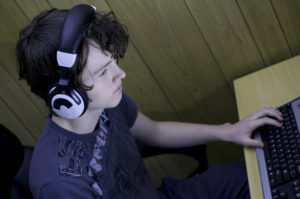 Social networking sites have exploded in the last decade and they should continue to grow for the foreseeable future as our world becomes more digitalized.
Social networking sites have exploded in the last decade and they should continue to grow for the foreseeable future as our world becomes more digitalized.
Kids and teenagers are as in on the social media wave as any demographic. According to Pew Research Center, 89% of teenagers use social media. Perhaps even more jarring, more than half of children use social media by the age of 10.
This should raise some concerns for parents, but it’s not altogether a bad thing, by any means. In fact, there are numerous benefits kids can get from social networking, including enhanced communication and improved social and technical skills.
That said, there are numerous risks kids face anytime they’re online that parents need to be aware of.
Eighty-seven percent of youths have witnessed cyberbullying, and over half of kids 10-17 have posted risky comments or photos online.
To address many of these effects – both positive and negative – the American Academy of Pediatrics even issued a clinical report, “The Impact of Social Media Use on Children, Adolescents and Families.”
Social media poses a unique set of challenges for parents because the digital world is constantly evolving, and it’s often an unfamiliar universe for parents who might have not even had a computer in their home as they were growing up.
Here are some tips for keeping your kids safe online:
Immerse yourself in social media
It’s going to be a lot easier to ensure your children are behaving responsibly online if you understand all the different social media platforms they’re using.
Facebook, Snapchat, Instagram, and Twitter are generally considered the most popular social networking sites used by teenagers. Each site has different features and functions. For example, Instagram is for posting photos and videos while Twitter features 140-character text-based tweets (although users can also post photos and videos).
Even if social media isn’t your thing, it’s a good idea to sign up for an account yourself so you have a better grasp of how each site works.
Set age limits
Social media should be off limits for children of a certain age.
Although it’s easy for underage users to start an account, most sites require users to be at least 13 years old to sign up. The Children’s Online Privacy Protection Act also prohibits companies from collecting personal information about kids under 13 without their parents’ permission.
Discuss the dangers
It might not be a comfortable conversation, but talk with your child about the risks they face online. Discuss the dangers of cyberbullying and explain how their actions online can have real-life consequences.
You also need to establish how you expect your child to behave online and what you deem acceptable behavior.
If children understand the risks of social media, they’ll be less likely to post risky comments or photos.
Monitor their use
Once you’ve agreed what sites your child is allowed to use, you’ll still want to keep an eye on what they’re actually doing online. It’s a fine line to walk, but you can accomplish this without being overbearing.
The first thing you can do is to keep your computer in a common area of your home rather than in your child’s bedroom, although that won’t help you monitor their mobile activity.
Depending on your child’s age, you might even set up their account and login once a week to make sure they’re not receiving any inappropriate private messages or friending strangers.
Use your own account to friend your child. That way you can keep an eye on the posts and photos they’re sharing.
Check privacy settings
Social media sites are constantly updating their apps and privacy settings (especially Facebook), so you’ll want to make sure your child’s settings are set to the strictest levels.
Power down
Just like TV and video games, children can end up spending way too much time on social media.
Set a time every evening when they are not allowed to log on to any social media sites. Encourage them to get outside and play. You want to make sure they’re developing other hobbies and interests.
It’s also a good idea to keep them away from all electronics before bedtime as the light exposure from screens negatively impacts sleep time, sleep quality, and daytime alertness.
Related
The Relationship Between Social Media And Divorce
Marriage & Divorce In The Social Media Era
The Facebook Divorce: How To Announce Your Divorce On Social Media


One comment on “Parent’s Guide To Keeping Kids Safe On Social Media”